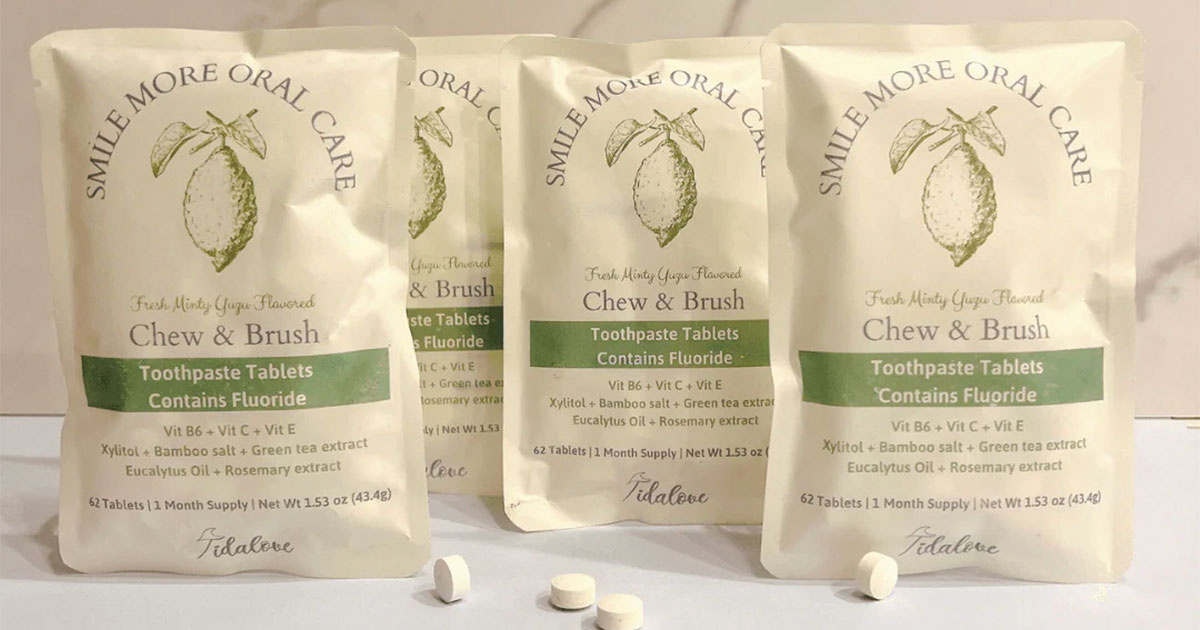Daily toothbrushing is an essential part of an oral health care regime. Toothpaste complements tooth brushing by providing important ingredients for fighting caries, preventing gum disease, and making your smile brighter.
Toothpaste is typically sold in liquid or gel form in collapsible tubes. These toothpaste tubes are made of plastic and aluminium, none of which can be recycled.
Impact of Toothpaste Tubes on Environmental Pollution
According to the World Health Organisation, the average person consumes six toothpaste tubes annually. Therefore millions of people will use billions of toothpaste tubes each year. Such consumption causes grave environmental damage, as heaps of plastic waste pile up yearly.
According to recycling experts from the independent eco-labelling programmes in Australia, toothpaste tubes are tough to recycle as they are made of various plastics and glazed metal, which makes recycling them even more challenging. Only 10% of the 1.5 billion toothpaste tubes discarded each year are recycled, meaning about 1.3 billion end up in landfill, incinerators and oceans, upsetting the fragile ecological balance.
Plastic waste in landfills and oceans disrupts food chains and ecosystems and takes hundreds of years to degrade. Plastic waste seriously threatens sea animals, which can choke on plastic trash. Microplastics have been detected in seafood.
Toothpaste tubes are a major contributor to non-recyclable plastic waste, leading environmental experts to demand action from toothpaste manufacturers. To tackle this problem of ever-increasing plastic waste from discarded toothpaste tubes, researchers introduced toothpaste tablets in 2007, marketed as a sustainable alternative to conventional toothpaste tubes.
What Are Toothpaste Tablets?
Now you might be wondering what toothpaste tablets are. They are dry, compressed discs that can be crushed and mixed with water to form a paste. They are marketed as having a major edge over conventional plastic tubes due to their recyclable packaging. Additionally, they are promoted among environmentalist groups as consisting of ingredients free from animal testing and cruelty.
Tidalove, an environmentally conscious business specialising in self-care products, introduced its fluoride-containing toothpaste tablets to meet all oral and environmental needs without compromising on the other.
Since toothpaste tablets’ advent, efficiency and sustainability have been debated among dental and environmental groups.
This article will compare many features of toothpaste tablets and conventional toothpaste tubes to help you decide what’s best for you and your patients.
How are Toothpaste Tablets Environment-Friendly?
For decades, regular toothpaste has been sold in collapsible plastic tubes discarded after we finish them, contributing to the ever-increasing size of plastic landfills and ocean plastic waste.
In contrast, toothpaste tables are available in recyclable packaging. Furthermore, Tidalove has introduced reusable tin packs of toothpaste tablets, which can be refilled monthly, eliminating the plastic trash that comes with every new pack of regular toothpaste.
If you’re an environmentalist and an oral hygiene enthusiast like me, toothpaste tablets are a win-win situation for us and the environment.
Are Toothpaste Tablets Any More Convenient Than Regular Toothpaste?
Frequent travellers know the pain of adhering to tight liquid allowances on-air. Regular toothpastes often fall into the liquid category, so travellers frequently need to buy extra travel-sized tubes for luggage.
This is where toothpaste tablets step in. They are dry, compact, and, unlike regular toothpaste, don’t fall under the liquid category, making them a very convenient choice for carry-on baggage. They also don’t leak into your luggage or bag, making them a less messy travel-friendly option.
If you’re travelling somewhere with extreme weather, Tidalove toothpaste tablets will be your oral hygiene partner, as they have a lower chance of drying out than regular toothpaste.
These characteristics make them an obvious choice for a frequent traveller, hiker, or anyone looking for a convenient toothpaste option.
What Are The Constituents of Toothpaste Tablets?
Tidalove has formulated its toothpaste tablets to be as nature friendly as possible, free from harmful ingredients usually found in conventional toothpaste, like:
- Preservatives, e.g.parabens, which disrupt normal endocrine function by releasing oestrogen,
- Foaming agents like sodium lauryl sulphate can cause irritation, dryness and sensitivity.
- Artificial colours
These tablets are also free of gluten and animal products, making them suitable for vegans and people with celiac disease.
While formulating toothpaste tablets and keeping the ingredients as natural as possible, many toothpaste tablet manufacturers tend to ignore an important player in maintaining oral health by fighting cavities, fluoride. Most manufacturers’ tablets contain only xylitol, an anti-cavity sugar, but alone is not enough to prevent cavities.
The absence of fluoride has led to criticism of toothpaste from the Dental community. Fluoride is an important element that reinforces enamel structure by replacing Hydroxyl ions in the Hydroxyapatite with fluoride ions, forming strong fluorapatite crystals more resistant to caries attacks. It also induces remineralisation in tooth structure, which is demineralised by the carious process.
According to the American Dental Association’s recommendation, Tidalove has introduced toothpaste tablets containing fluoride, the mainstay anti-caries agent. “We are thrilled to introduce Tidalove toothpaste tablets, a game-changer in oral care,” said Penny Choi, founder of Tidalove, at the launch of their toothpaste tablets, “Our fluoride-infused tablets offer a sustainable alternative to traditional toothpaste, allowing individuals to maintain their oral health while contributing to a cleaner planet.”
With the addition of fluoride in toothpaste tablets’ formulation, more dentists are likely to recommend it to their patients.
Apart from fluoride, Tidalove has formulated toothpaste tablets with the following beneficial EWG Green Grade ingredients:
- Xylitol – the only anti-cavity sugar
- Sodium bicarbonate – neutralises plaque-causing acid.
- Hydroxyapatite – an important constituent of enamel structure
- Silicon Dioxide – an anti-plaque agent
- Green tea extract – anti-inflammatory effects
- Apple extract – controls Halitosis (bad breath)
- Rosemary Extract – eliminates bacteria.
- Vitamins E, B6, and C: prevention of gum disease
Are Toothpaste Tablets as Efficient as Regular Toothpaste?
A major concern for a dental professional would be: Are these toothpaste tablets as efficient as conventional toothpaste?
The efficacy of toothpaste depends on its constituents having the ability to prevent cavities, gum disease and provide a clean, fresh smile.
Tidalove toothpaste tablets have many potent ingredients (as previously mentioned) that provide an efficient cleaning action, including fluoride, making it even better.
According to research comparing the abrasiveness of both toothpaste options by a micro-computed tomography analysis, toothpaste tablets were less abrasive than conventional toothpaste. This means that tablets provide a gentle brushing experience essential to maintaining the irreplaceable enamel layer. [1]
How to Use Toothpaste Tablets
Regular toothpaste tubes are easy to use; squeeze it out of the tube on the toothbrush, wet it and start tooth brushing. Toothpaste tablets may be odd for some people, mostly because it is a new experience, not because it’s difficult.
Using it is simple in just four easy steps:
- Chew: take a Tidalove toothpaste tablet and place it in your mouth; chew the tablet to break it apart, and let it mix with saliva to form a paste.
- Brush: use your soft-bristled toothbrush to brush your teeth; make sure to clean your tongue by the backside of the toothbrush or a tongue cleaner
- Rinse: After brushing, rinse thoroughly with water. Some users may experience a gritty feeling, but another rinse would eliminate that feeling.
- Smile: Enjoy a brighter smile every day.
What Else Does Tidalove Have to Offer?
Tidalove tablets offer a greener substitute for regular toothpaste by eliminating single-use plastic waste. Furthermore, you can purchase refills eliminating the need to buy another tin pack for storage. Tidalove offers these tablets in two delicious flavours: Sweet Cinnamon & Minty Yuzu. [https://tidalove.com/collections/oral-care].
References:
- Shaikh M, Lund G, Ko J, Roque-Torres G, Oyoyo U, Kwon SR. Micro-computed tomography analysis of abrasivity of toothpaste tablets compared to conventional toothpaste. Am J Dent. 2021 Oct;34(5):235-239. PMID: 34689444.













